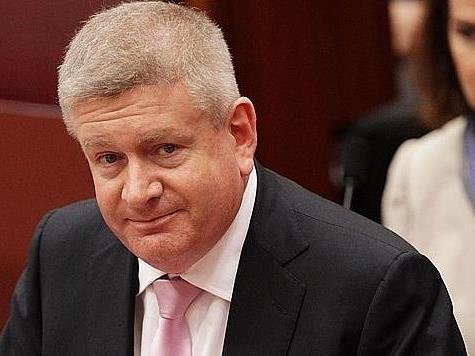Minister for Communications and the Arts, Senator Mitch Fifield
Like any population with new liberators, the general arts and screen communities are learning that they may be disappointed. On Tuesday, the new Minister for both Arts and Communications Senator Mitch Fifield gave his first interview, an encounter with Patricia Karvelas on the ABC’s Radio National.
The New Minister may be less pugnacious than the old but there was no sign that Mitch the Mild intended to change the policies that have so upset either the arts or communications sectors, including the attack on the Australia Council which has prompted a Senate Inquiry and the loss of funding to the ABC.
It seems the arts sector’s celebrations at the demise of Brandis may have been premature and their anxieties more justified.
Fifield trotted out the same old flim-flam, when he denied that the ABC’s ‘administrative efficiencies’ were actually cuts, while saying that politicians should speak plainly.
He was disingenuous when he denied that the arts funding changes are a major revamp of the system. Although he is correct that there are no overall cuts, and that the loss to the Australia Council is ‘only’ about $26m a year in a budget of $185 million, the transfer of $26 million a year will make a huge difference to artists and small-to-medium arts organisations. Former Minister Brandis guaranteed there would be no cuts to the majors, and the National Program for Excellence in the Arts(NPEA) draft guidelines prevent funding for operating revenue or the funding of individual artists.
Ultimately it will have a massive effect on the entire arts ecology and the cultural life of Australia, as thousands of submissions to the Senate Inquiry have made clear.
Fifield told Karvelas that, ‘There has been an extensive period of consultation, something of the order of 320 submissions have come in.’ Meanwhile, there have been more than 2,000 submissions to the Senate enquiry which are overwhelmingly opposed to the change.
The Australia Council estimates the effect will be a loss of a third of grants available to the arts sector outside the 28 major performing arts companies.
Karvelas cited ArtsPeak Co-Convenor Tamara Winikoff’s statement that the NPEA will ‘decimate all the small to medium infrastructure organisations, which are the sort of supply line really for both artists to work from at any stage in their career and also to feed into the major organisations’.
The Minister did not respond directly but to these concerns but his responses when Karvelas suggested returning funds to the Australia Council were not encouraging.
KARVELAS: It’s still under negotiation, the National Program of Excellence in the Arts? Your door is still open on this issue?
FIFIELD: Well, the exact form has yet to be announced. As a Government we seek consultation for a reason. It’s because we know that we can always benefit from the views of people who are intimately involved in the sector.
KARVELAS: Will you at least restore the funding taken from the Australia Council?
FIFIELD: Well there’s been not a dollar, as I say, taken from…
KARVELAS: Will you move it back to the Australia Council?
FIFIELD: …from the Arts Portfolio. We’ve still got the same quantum of money in the Arts Portfolio. The only issue is exactly how that money is deployed and look, we’re looking at trying something a little different.
KARVELAS: So you might move it back to the Australia Council?
FIFIELD: Well you shouldn’t read anything into what I’ve said. We’ve undertaken a period of consultation and the program is not yet announced in its final form.
KARVELAS: Ok, well I think that’s pretty clear that you’re not settled on that, it might go back to the Australia Council. Interesting to find that out.
FIFIELD: No, I’m not saying that, I’m not saying for a moment that money will return to the Australia Council. What I’m saying is that…
KARVELAS: Are you saying it might?
FIFIELD: No, what I’m saying is that the exact nature and design of the program outside the Australia Council is yet to be completely nailed down.’
Fifield’s new domain now includes the whole arts and communications sector, which makes sense according to lobbyists in the screen sector, whose support was split across Ministries.
This includes censorship and copyright, both hot button issues across the arts and screen sectors. Fifield is a career politician rather than a lawyer. Brandis, still the Attorney General, is a Queen’s Counsel, previously active in trade practices law. He has actively promoted the importance of private property in his discussion of copyright law reform, though he has done almost nothing about advancing the issue. It remains a hot potato no-one has been game to touch.
The Depart of Communications and the Arts is now responsible for:
- The Australia Council
- Creative Partnerships Australia
- The Australian Film, Television and Radio School
- The Australian National Maritime Museum
- The National Film and Sound Archive
- The National Gallery
- The National Library
- The National Museum
- The National Portrait Gallery
- Screen Australia
- The ABC & SBS
- The Australian Communications and Media Authority
- … and – take a deep breath – the National Broadband Network.
Fifield comes from the tricky task of implementing the National Disability Insurance, on which he has been watched carefully by the ALP. He has at least kept the scheme off the front page, and it is trundling forward. But this new Ministry is about the media, and that guarantees a much feistier can of worms.
Fifield told the ABC, ‘I follow the approach of John Howard, I don’t recall John Howard ever being critical of the media. Sometimes you love them, sometimes you don’t. Sometimes you like the coverage you get, sometimes you don’t. But, you know, that’s showbiz.’
On a lighter note, Fifield showed at least one difference from his predecessor. Brandis was well known for his preference for heritage arts and his belief that arts should cater for the ‘great audiences’ of opera and ballet. Fifield confessed his own predilection is for 80s’ music, particularly the Pet Shop Boys.
Reaction
Reaction from the sector to Fifield’s interview showed immediate disappointment. Campaigning group Free The Arts put out a release saying, ‘Artists who were genuinely excited by the Prime Minister’s new vision for an ‘agile, innovative and creative Australia’ will now be gearing up to mobilise against the government. With an early election on the cards Senator Fifield needs to restore faith by putting an immediate halt to the roll-out of the National Program for Excellence in the Arts (NPEA) and the Book Council.
‘He urgently needs to consult with the Australia Council and with his colleagues who have been leading the Senate Inquiry hearings across the country. He also needs to listen to his state and territory counterparts as well as philanthropic sector leaders.’






